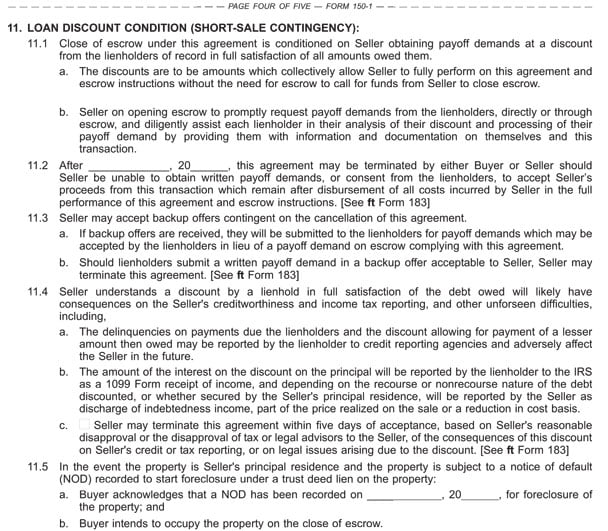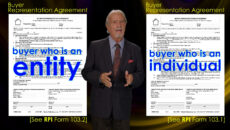Purchase agreements; both conventional and equity purchase, modified for short-sales
This article introduces two short-sale variations for an offer to purchase negative equity real estate conditioned on the lenders’ acceptance of a reduced payoff amount.
The conventional purchase agreement, first tuesday Form 150, is used by brokers and their agents to prepare and submit a buyer’s written offer to purchase one-to-four unit residential property located in California and not yet in foreclosure. Similarly, the purchase agreement with a short-sale contingency, first tuesday Form 150-1, is used to submit the buyer’s offer to purchase one-to-four unit residential property conditioned on the seller obtaining a written payoff demand at a discount from the lender of record in full satisfaction of all amounts owed on the loan. [See first tuesday Form 150-1 § 11.1]
Through a payoff demand, the lender agrees to accept the seller’s net sales proceeds on the price to be paid by a buyer, an amount lower than the lender’s outstanding mortgage balance.
The purchase agreement offer with the short-sale contingency provision becomes a binding written contract between the buyer and seller on acceptance. However, if the seller is unable to obtain payoff demands from the lenders who hold his trust deed loans, the agreement may be terminated and rendered unenforceable at the discretion of either the buyer or seller. [See Form 150-1 § 11.2]
Form 150-1 is a comprehensive “boilerplate” purchase agreement with additional and modified provisions specific to short-sale arrangements. Form 150-1 serves as a checklist presenting the various conventional financing arrangements available to the buyer to fund the purchase price and conditions a prudent buyer and his agent would consider when making an offer to purchase. As for the seller, his performance is conditioned on the acceptance of a reduced payoff amount by the lenders who hold the loans.
Equity purchase (EP) laws are triggered and must be part of the purchase agreement when an owner-occupied, one-to-four unit residential property in foreclosure is acquired for rental, investment or dealer purposes by a buyer, who is called an EP investor. An EP investor acquiring a property which is over-encumbered requiring short-sale arrangements with the lender uses the equity purchase agreement which contains a short-sale contingency provision. An investor’s equity purchase under short-sale conditions requires the seller to obtain a written payoff demand at a discount from the seller’s lender in full satisfaction of all amounts owed. [See first tuesday Form 156-1 § 11]














